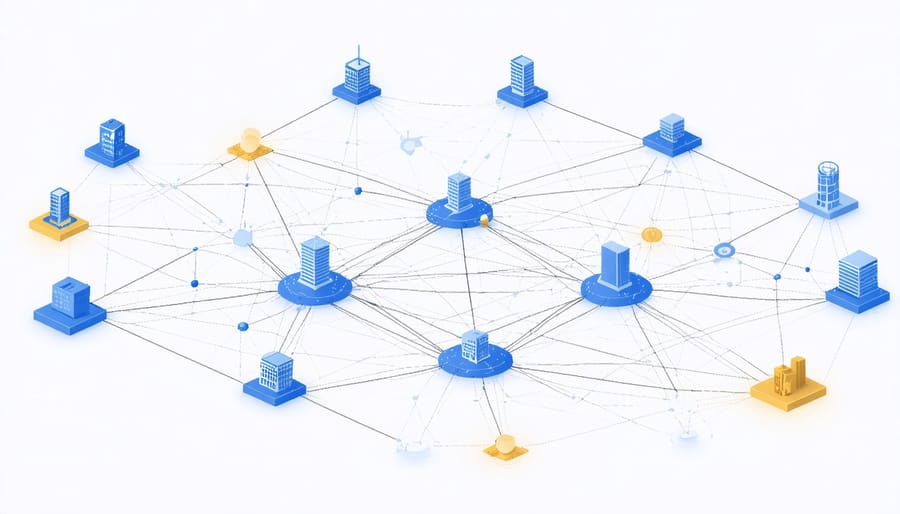Construction supply chain jobs represent a critical intersection of logistics expertise and construction industry knowledge, driving the seamless flow of materials from manufacturers to job sites across the globe. As construction companies optimize supply chain operations, demand for skilled professionals in this specialized field continues to surge, offering diverse career opportunities with competitive compensation packages.
Today’s construction supply chain professionals leverage advanced technology, data analytics, and strategic planning to manage complex material procurement, inventory control, and delivery scheduling. From procurement specialists and logistics coordinators to supply chain managers and digital transformation leads, these roles combine traditional construction expertise with modern supply chain methodologies.
With the construction industry’s increasing focus on sustainability, cost efficiency, and digital integration, supply chain professionals must master both conventional logistics principles and emerging technologies. This dynamic field rewards those who can navigate global supplier networks, implement real-time tracking systems, and develop resilient supply strategies while maintaining strict quality standards and deadline adherence.
Key Roles Shaping Modern Construction Supply Chains
Procurement Managers and Specialists
Procurement managers and specialists play a pivotal role in modern supply chain management within the construction industry. These professionals are responsible for sourcing materials, negotiating contracts, managing vendor relationships, and ensuring timely delivery of construction supplies while maintaining cost-effectiveness.
Key responsibilities include developing procurement strategies, conducting market analysis, evaluating supplier performance, and maintaining compliance with industry regulations. They must balance quality requirements with budget constraints while managing risk across the supply chain.
Successful candidates typically hold a bachelor’s degree in supply chain management, business administration, or construction management. Many employers prefer professionals with relevant certifications such as CPSM (Certified Professional in Supply Management) or CSCP (Certified Supply Chain Professional).
Essential skills include strong analytical capabilities, negotiation expertise, and proficiency in procurement software systems. Experience with construction materials and understanding of building codes is crucial. These professionals must also possess excellent communication skills to coordinate effectively with suppliers, contractors, and project managers.
The role offers competitive compensation, with experienced professionals earning between $80,000 and $150,000 annually, depending on location and expertise.
Logistics Coordinators and Material Planners
Logistics Coordinators and Material Planners serve as the backbone of construction supply chain operations, orchestrating the complex flow of materials from suppliers to construction sites. These professionals implement sophisticated material management strategies to ensure timely delivery while optimizing inventory levels and reducing waste.
Their responsibilities encompass forecasting material requirements, coordinating with suppliers, managing warehousing operations, and maintaining precise scheduling systems. They work closely with project managers to align material deliveries with construction timelines, preventing costly delays and ensuring seamless site operations.
Success in these roles requires strong analytical skills, proficiency in inventory management software, and excellent communication abilities. These professionals must balance multiple stakeholder needs while maintaining cost-effectiveness and adhering to quality standards. They also play a crucial role in risk management by maintaining alternative supplier relationships and developing contingency plans for potential supply chain disruptions.
As construction projects become more complex, these positions increasingly demand expertise in digital planning tools and sustainable procurement practices, making them essential for modern construction operations.
Supply Chain Analytics Experts
Supply chain analytics experts play a pivotal role in modern construction logistics by leveraging data-driven insights to optimize material flow, reduce costs, and enhance project efficiency. These professionals utilize advanced analytics tools and predictive modeling to forecast material demands, identify potential bottlenecks, and streamline procurement processes.
Their responsibilities include analyzing historical data patterns, implementing inventory optimization strategies, and developing performance metrics that drive operational improvements. Through sophisticated data visualization and reporting, they help construction companies make informed decisions about supplier selection, warehousing, and distribution networks.
The growing integration of IoT sensors and real-time tracking systems has made these roles increasingly vital. Analytics experts work closely with project managers and suppliers to establish data-driven frameworks that minimize waste, improve delivery timing, and maintain optimal inventory levels. Their expertise in statistical analysis and supply chain software enables construction firms to achieve significant cost savings while maintaining project timelines.

Technology’s Impact on Supply Chain Careers
Digital Platform Management
Digital platform management has emerged as a crucial role in modern construction supply chain operations. These specialists oversee and optimize the implementation of construction-specific software systems, including Enterprise Resource Planning (ERP) platforms, Building Information Modeling (BIM) integration tools, and inventory management solutions.
Platform managers typically handle system configurations, user training, data analytics, and integration between various digital tools used across the supply chain network. They work closely with vendors, contractors, and internal teams to ensure seamless information flow and process automation.
Key responsibilities include maintaining digital procurement platforms, managing supplier portals, and implementing real-time tracking systems for materials and equipment. These professionals must possess a unique blend of technical expertise and construction industry knowledge to effectively customize and deploy solutions that meet specific project requirements.
The role requires proficiency in construction management software, database administration, and API integration. Successful platform managers often have backgrounds in construction technology, supply chain management, or information systems, combined with practical experience in construction operations.
As construction firms increasingly adopt digital transformation initiatives, these positions offer competitive salaries and growth opportunities, with professionals often advancing to senior technology leadership roles within construction organizations.
IoT and Automation Specialists
The integration of IoT (Internet of Things) and automation technologies is revolutionizing construction supply chain management, creating new specialized roles that bridge technology and construction expertise. IoT and Automation Specialists are responsible for implementing and managing smart systems that monitor material flow, equipment utilization, and inventory levels in real-time.
These professionals typically work with sensor networks, data analytics platforms, and automated material handling systems to optimize supply chain operations. Key responsibilities include configuring IoT devices for inventory tracking, developing automation protocols for warehouse operations, and creating systems that predict material requirements based on project timelines.
Successful specialists in this field combine technical expertise in computer systems and networking with a solid understanding of construction logistics. They must be proficient in data analysis, cloud computing, and industrial automation while maintaining knowledge of construction materials and processes.
The role requires certifications in relevant technologies and typically commands competitive salaries due to high demand. As construction companies increasingly adopt smart technologies, these specialists are becoming integral to modern construction supply chains, particularly in large-scale projects where efficiency and precision are crucial.
Growth opportunities in this field are substantial, with professionals often advancing to roles such as Digital Construction Manager or Technology Integration Director.
Career Growth and Development Pathways

Essential Skills and Certifications
Success in construction supply chain roles requires a blend of technical expertise, industry knowledge, and professional certifications. Core competencies include inventory management, procurement strategies, logistics coordination, and supplier relationship management. Professionals should demonstrate strong analytical skills, proficiency in supply chain management software, and expertise in construction materials and specifications.
Essential certifications that enhance career prospects include the Certified Supply Chain Professional (CSCP), Certified Professional in Supply Management (CPSM), and Project Management Professional (PMP) credentials. Construction-specific certifications like the Construction Supply Chain Professional (CSCP) certification from the Construction Industry Institute provide specialized validation of industry knowledge.
Technical skills requirements encompass proficiency in Enterprise Resource Planning (ERP) systems, Material Requirements Planning (MRP) software, and construction management platforms. Understanding of Building Information Modeling (BIM) technology and its integration with supply chain processes is increasingly valuable.
Soft skills are equally crucial, including negotiation abilities, communication excellence, problem-solving capabilities, and team leadership. Experience with lean construction principles, sustainability practices, and risk management strengthens professional credentials.
Educational requirements typically include a bachelor’s degree in supply chain management, construction management, business administration, or related fields. Many senior positions prefer candidates with advanced degrees or specialized training in construction supply chain operations.
Continuous professional development through industry workshops, seminars, and advanced certifications helps maintain competitive edge in this evolving field.
Career Advancement Opportunities
The construction supply chain sector offers numerous pathways for career advancement, with opportunities spanning both vertical and lateral progression. Professionals typically begin in entry-level positions such as inventory coordinators or procurement assistants, advancing to mid-level roles like supply chain analysts or category managers within 3-5 years.
With experience and additional certifications, professionals can progress to senior positions such as Supply Chain Manager, Director of Procurement, or Chief Supply Chain Officer. Many successful leaders in the field complement their practical experience with advanced credentials like CSCP (Certified Supply Chain Professional) or CPSM (Certified Professional in Supply Management).
Cross-functional experience is increasingly valued, with many professionals rotating through different aspects of the supply chain, including logistics, vendor management, and materials planning. This diverse exposure strengthens their understanding of the entire supply chain ecosystem and enhances their leadership potential.
Strategic career advancement often involves developing expertise in emerging technologies like Building Information Modeling (BIM), IoT applications, and sustainable construction practices. Professionals who combine traditional supply chain knowledge with digital transformation skills are particularly well-positioned for executive roles.
Networking through industry associations, participating in major construction projects, and gaining international experience can accelerate career progression. Many successful professionals also pursue specialized training in lean construction principles and agile project management methodologies to enhance their value proposition in the industry.
Industry Trends and Future Outlook
Sustainable Supply Chain Management
In today’s construction industry, sustainable supply chain management has become a critical focus area, creating numerous opportunities for sustainable construction careers. Supply chain professionals are increasingly tasked with implementing green initiatives, from sourcing eco-friendly materials to optimizing transportation routes for reduced carbon emissions. Key responsibilities include evaluating suppliers’ environmental practices, maintaining compliance with sustainability certifications, and developing waste reduction strategies.
Career opportunities in this sector include Sustainability Coordinators, Green Supply Chain Managers, and Environmental Compliance Officers. These roles require expertise in both traditional supply chain management and environmental standards such as LEED, BREEAM, and ISO 14001. Professionals must demonstrate proficiency in carbon footprint analysis, lifecycle assessment, and sustainable procurement practices.
Companies are particularly seeking candidates with experience in circular economy principles, renewable material sourcing, and digital tools for environmental impact tracking. Success in these positions demands a balance of technical knowledge, environmental awareness, and strong stakeholder management skills, as sustainability initiatives often involve collaboration across multiple departments and external partners.

Global Supply Chain Expertise
In today’s interconnected construction industry, global supply chain expertise has become increasingly vital. Construction professionals managing international material sourcing must navigate complex logistics networks spanning multiple continents and time zones. These roles typically involve coordinating with suppliers from regions like Southeast Asia for steel components, European manufacturers for specialized equipment, and South American suppliers for timber products.
Key responsibilities include managing international shipping logistics, understanding import/export regulations, and ensuring compliance with varying national building codes and standards. Successful professionals in this field often possess knowledge of international trade agreements, customs procedures, and foreign currency exchange implications.
Cultural competence and cross-border communication skills are essential, as these positions frequently require collaboration with diverse teams worldwide. Supply chain managers must also stay informed about global market trends, geopolitical factors affecting material availability, and international sustainability requirements.
Many organizations now seek professionals with experience in global enterprise resource planning (ERP) systems and international quality control protocols. Understanding of international construction standards, such as ISO certifications and regional building codes, is particularly valuable in these positions.
Emerging Job Roles
As the construction industry embraces digital transformation and sustainable practices, several new job roles are expected to emerge by 2028. Supply Chain Digital Integration Managers will become crucial, overseeing the implementation and management of IoT sensors, blockchain technology, and automated inventory systems. These professionals will ensure seamless connectivity between various supply chain components.
Sustainability Compliance Coordinators will gain prominence as construction firms focus on eco-friendly materials and circular economy principles. These specialists will manage green certification processes and ensure supply chains meet increasingly stringent environmental regulations.
Data Analytics Specialists in construction supply chain will be in high demand, utilizing predictive modeling and machine learning to optimize inventory levels and delivery schedules. The role of Supply Chain Risk Mitigation Officers will expand, focusing on developing resilient supply networks that can withstand global disruptions.
Another emerging position is the Construction Materials Innovation Manager, who will work with suppliers to develop and source new sustainable building materials while ensuring they meet performance requirements and cost objectives. Additionally, Last-Mile Logistics Coordinators will become essential in urban construction projects, managing complex delivery schedules in congested city environments.
The construction supply chain management field offers diverse and rewarding career opportunities for professionals seeking to make their mark in the industry. As construction projects become increasingly complex and global, the demand for skilled supply chain professionals continues to grow, presenting excellent prospects for career advancement and professional development.
To position yourself for success in this field, focus on developing a strong foundation in both construction fundamentals and supply chain principles. Pursue relevant certifications such as CSCP (Certified Supply Chain Professional) or CPSM (Certified Professional in Supply Management), which can significantly enhance your credibility and marketability. Additionally, staying current with digital technologies and supply chain management software is crucial as the industry undergoes digital transformation.
Networking remains vital for career growth. Join professional organizations like the Construction Supply Chain Management Association (CSCMA) and attend industry conferences to build valuable connections and stay informed about emerging trends and opportunities.
Consider starting in entry-level positions such as procurement coordinator or inventory specialist to gain hands-on experience. From there, progress to roles with increasing responsibility, such as supply chain analyst, logistics manager, or eventually, supply chain director. Many successful professionals also benefit from mentorship programs and continuous learning opportunities offered by their employers.
The future of construction supply chain management promises exciting challenges and opportunities, particularly in sustainable practices and technological innovation. By maintaining a commitment to professional development and adapting to industry changes, you can build a successful, long-term career in this dynamic field.

